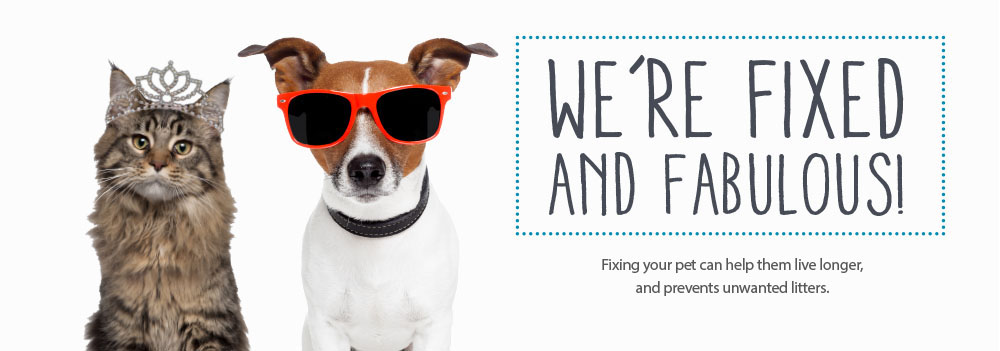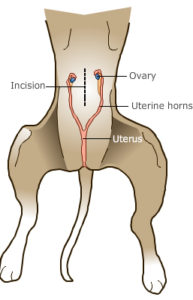It not only helps keep your pets safe from a number of medical issues, but it also helps reduce overpopulation. Every day, pets across the country are euthanized because shelters don’t have enough space or resources to care for them. By spaying or neutering your pet, you are helping to stop this tragic problem.
Here’s a list of answers to the most common questions related to spaying and neutering.
- Is the surgery safe? – Yes. It is a common medical procedure, you can rest assured that your veterinarian has a wealth of experience with the surgery. Whenever an animal is put under anesthesia, there is some risk, but your veterinarian will be on the lookout for signs of illness or any other possible complications. Preanesthetic blood work is always recommended for your pets to help us identify if there are any internal issues that we can find before hand.
- What can I do to keep my pet safe? – Follow all preoperative and postoperative instructions your veterinarian gives you carefully, including scheduling their postoperative appointment. If you have questions, please don’t hesitate to call the clinic to inquire. If you have any concerns after your pet’s surgery, don’t hesitate to call after hours and speak with our on-call veterinary staff.
- How old does my pet need to be? – Your pet is safe to undergo the surgical procedures as soon as they are two months of age or two pounds in weight (if you are very concerned about them reproducing, i.e. barn/outdoor cats), but the average age is around 4-6 months. If you have a female it is best to get her spayed before she has her first heat (this normally occurs around 6 months of age). If you have a male it is best to make sure both his testicles are descended. If they are not by the time he is 6 months of age make sure you let the staff know when scheduling his surgery as the procedure to locate and remove the undescended testicle is more lengthy and has an additional cost. If you have a large breed male (i.e. labrador, mastiff, shepherd, etc.) we often recommend waiting to have their surgery performed until after 1 year of age as the additional testosterone helps strengthen their cruciate ligaments. This is of course only if you are not having any behavioral or training issues and can guarantee your dog is not going to breed any intact females. If you have any questions about when to get your dog spayed or neutered, please give us a call at the clinic.
- Should I wait until my female dog has had one litter before spaying? – No, it’s actually easier on your dog to have the surgery before her first heat. Even after just one litter, her reproductive organs become more friable which adds an additional risk to the procedure. Plus, by allowing your dog to have some puppies, you’re contributing to the pet overpopulation problem.
- Should my female dog go into heat before she’s spayed? – No, by getting her spayed before her first heat, you can greatly reduce her risk of mammary tumors.
- How long after giving birth can my pet be spayed? – The procedure can be done as soon as the pups/kittens are weaned, usually four to five weeks.
- What are some of the health benefits? – Females have no risk of infections, cancers, or diseases of the uterus (which is removed), and also a reduced risk of mammary cancer. Males have no risk of testicular cancer and a reduced risk of prostate cancer. The surgery also reduces some problem behaviors related to mating, such as roaming, marking, and aggression.
- Will my pet be given pain relief? – Yes. Your pet won’t feel any pain during the surgery. The sedation we give our surgical patients before surgery contains excellent pain control. During their procedure, they are given an injection which will provide pain management for 24 hours after the surgery. In addition to this injection, you can take home additional oral pain medications for your pet as prescribed by your veterinarian. All patients undergoing a surgery benefit greatly from postoperative pain medication and is always an option. At our clinic, we make additional postoperative pain medication for patients undergoing a spay mandatory as it is an extremely invasive procedure. If you feel your pet is still in pain after their surgery please call the clinic and talk to your veterinarian. Never administer human pain medications as many of them are poisonous to our pets!
- Will my pet get fat after the surgery? – After the removal of your pet’s reproductive organs, their body doesn’t need as many calories. Just like humans, animals gain weight if they’re eating too much or not getting enough exercise. Provide your pets with regular walks/playtime and always measure their food to prevent overeating and they’ll stay fit!

To schedule your pet’s surgery to have your pet spayed or neutered or to learn more about this procedure, call or visit our clinic. If you are struggling with the decision of whether to spay your pet, please call us so we can discuss your concerns.


